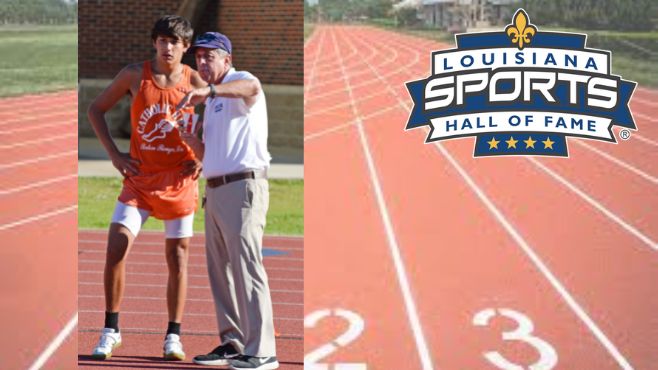
Stories about turning a childhood passion for sports into a way of life are not new. Many are dismissed as cliché.
Claney Duplechin marvels as he tells his. A combination of fate and philosophy define his career as a record-setting high school coach that is anything but ordinary.
“I keep pinching myself … I don’t understand how we’ve got so many titles,” Duplechin said. “Every year is different. It’s different kids and you have to have some talent.
“What we have always had are kids who have been willing to work. It’s a tradition of work. It’s like a snowball that continues to roll.”
The Mamou native has won 64 LHSAA titles in track and cross country, a total that ranks sixth nationally, according to MaxPreps. A streak of 25 straight boys cross country titles is second all time by the National Federation of High Schools.
Add three national coach of the year honors and the MaxPreps 2020 rankings that put Duplechin among the best 100 high school coaches in the nation. Yes, the picture of excellence is clear, and it has earned him entry into the Louisiana Sports Hall of Fame.
Duplechin and 11 others will be enshrined June 23-25 in Natchitoches during the Class of 2022 Induction Celebration. For participation opportunities and information, visit LaSportsHall.com or call 318-238-4255.
All of his success is rooted in Duplechin’s sophomore year of high school.
He got challenged by a formidable mentor and started dating the girl who has now been his wife for nearly 49 years. Fate delivered a double whammy and Duplechin is grateful.
“I didn’t know if I would go to school (college),” Duplechin explains. “Neither of my parents graduated high school. Maybe I would have worked on the farm or worked offshore like some people do.
“I never gave it much thought … until I met Phyllis and had coach (Floyd) Aucoin as a teacher.”
A geometry classroom showdown with Aucoin, the Mamou High football coach who also was his youth baseball coach, was transformative.
“I was sitting in the back of class cutting up … just normal stuff. And he (Aucoin) said, ‘I want to see you after class,’ ” Duplechin recalled.
“I went to the front of the classroom and he said, ‘Listen, I’ve been coaching you since you were seven years old. I know you’re not stupid. I know you’re smart. From now on, you are going to sit right here, right next to my desk, and make straight As.
“And that was what happened. He was an ex-Marine, someone I respected the heck out of. That, right there, changed my life.”
Duplechin was a high school quarterback. He also played basketball, baseball and competed in track, ironically, only when there was no conflict with baseball.
“Phyllis and her siblings were all valedictorians at Mamou High. So, there was no question school was in the future for me,” Duplechin said. “I went to summer school at LSU right after high school. A lot of people changed their major. Not me, I wanted to be a coach.”
Duplechin was hired at Catholic High of Baton Rouge four years later. He was set to coach freshman football and wanted baseball to be his second sport. Instead, he was assigned to coach freshman track under another Louisiana Sports Hall of Famer, Pete Boudreaux.
Perfect setup for a cliché, “And the rest is history.” Only it wasn’t … at least not at first. Duplechin quickly worked his way through the ranks to become defensive coordinator.
The Bears’ defense earned the nickname “Orange Crush.” Duplechin also became Boudreaux’s varsity assistant in track. At age 24, Duplechin was hired as head football coach, track coach and athletic director at then Class 1A Episcopal.
It was 1978. Fate stepped in with what has been the opportunity of a lifetime. Self-realization, a new philosophy and track and field success followed. There was no lightning in a bottle or overnight event.
“I coached football for six years and enjoyed it,” Duplechin said. “We changed the program and were 7-3 my last two years. At the time, we had a coach on staff, Brannon LeBlanc, who wanted to be a head football coach.
“I looked at my own two children and saw them growing. I wanted to spend more time with them. When Brannon said he was going to leave, I said, ‘Stop.’ We swapped positions.”
Duplechin already had a reputation as a player’s coach and as a motivator.
Oddly enough, he started coaching cross country in his final year as head football coach and the Knights finished second in Class A. Duplechin admits he was “hooked” on cross country then.
One Episcopal football/track athlete forced Duplechin to scrutinize himself. That athlete, Tommy Bell, does not recall the conversation but is among Duplechin’s friends.
“ ‘Coach, you were like Jekyll and Hyde. You were so crazy and animated in football. Then in track, you are this calm,’ ” Duplechin recalls Bell telling him. “In football, that was the model … to scream, and it fit me because I am a Type A personality. But I learned from Pete there were other ways to coach. You don’t have to raise your voice.
“That got me thinking – I’ve got to become who I am. My philosophy about winning changed. As a young coach, winning is the only thing sometimes. I knew I wanted to make kids better people first, then see what happens, win or lose.
“I preach that with the breakout – ‘Go Knights, good people, have fun, state champs’ every day. Personal bests, or PRs … each person working to be better each day is most important.”
Since then, history has been made. Lives, including Duplechin’s, have changed and/or been enriched.
“He was a dream to work with … once we got through the (Cajun accent) language barrier,” Boudreaux jokes. “He took on responsibility in football and track at Catholic. Today, guys interview for jobs and they tell you what they can’t do or don’t want to do.
“Claney threw his heart and soul into everything he did here and continues to do so. He is not a big horn-blower. He does not talk about things he or his teams have done. He does his job consistently.”
Whether the subject is track and field or life lessons, Duplechin’s platform is teaching. Much has been made of “The Streak” … the Knights’ string of 25 straight boys cross country titles that ended last fall with a second-place finish to local rival The Dunham School.
Duplechin contends a loss the year before the streak began is just as meaningful. A student/athlete was caught cheating and Duplechin chose to sit him out for the state meet, even though he had been cleared to compete.
“My reasoning was that there must be consequences in sports, just like there are in life. I think our athletes saw that and realized I said what I meant and meant what I said,” Duplechin said. “It galvanized things.
Without that second place, I am not sure we get 25 titles in a row.”
Each practice begins with motivational quotations Duplechin finds. He shakes hands with all his athletes after practice and asks them to provide feedback. Duplechin encourages them to send handwritten notes to people they care about. He took his own advice, writing a lengthy letter to Aucoin, who battled cancer before his death.
“I get texts and emails from former athletes who remember those quotes and apply them to their lives today,” Duplechin said. “I never expected that.”
Duplechin certainly is proof that good guys don’t finish last. He also is a good guy who really knows track.
“In the 10 years I was at Episcopal I learned to be ready for anything and that we would practice every day … indoors or out,” retired
Episcopal girls track/cross country coach Eddie Cole said. “Claney does not like days off. Watching him coach every day was incredible because his knowledge of all the (track) events is second to none. I’ve gone to clinics and learned much less. He is a master.”
Episcopal’s football-baseball coach Travis Bourgeois and athletic director Randy Richard meticulously explain Duplechin’s impact on their careers. Both enjoy watching Duplechin coach the latest generation of athletes, which includes his grandson.
“For 26 of my 27 years at Episcopal I shared an office with Claney,” Bourgeois said. “His approach is based on people. He taught me to engage with athletes and teaching.
“He told me I needed to be more than a coach. I learned from him how important it was to go watch athletes do other things, like perform in the choir or in a play.
“Claney said, ‘once you show them you care, they care more.’ He’s right. It is the same with teaching. He showed me how to make teaching an experience for students and not just what you do until practice.”
Richard was an ex-football player who knew nothing about the shot put or discus. Duplechin forced him to learn how to coach throws instead of handing over ready-made workouts.
“He didn’t just put me out there on my own,” Richard said. “He watched and helped me learn the events and how to do things the right way. He is a teacher first.”
Duplechin’s older brother, Rob, gushes, “I am most proud of the way he handles his athletes. He gets the most out of them.”
Phyllis Duplechin said the decision to come to LSU allowed both her and her husband to make their dreams come true. And then some.
“I knew Claney would be a wonderful coach, but of course, I had no idea it would take up so much time,” she said. “You can still find me and other members of the family in the press box now working meets.”
To this day, Duplechin sees himself as an extension of his football coach/geometry teacher Floyd Aucoin. Never was that more evident than last month when the Knights beat the odds to finish second at the LHSAA’s Class 2A outdoor meet.
It wasn’t a title. But to the coach, it meant just as much.
“We had so many personal bests across the board,” Duplechin said. “We exceeded all expectations and were the best we could be. You can never ask for more.”
Written for the LSWA by Robin Fambrough.

